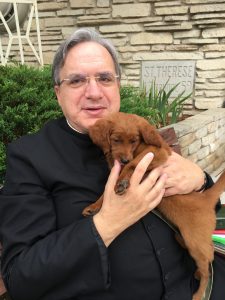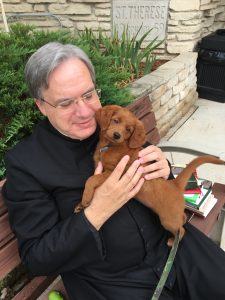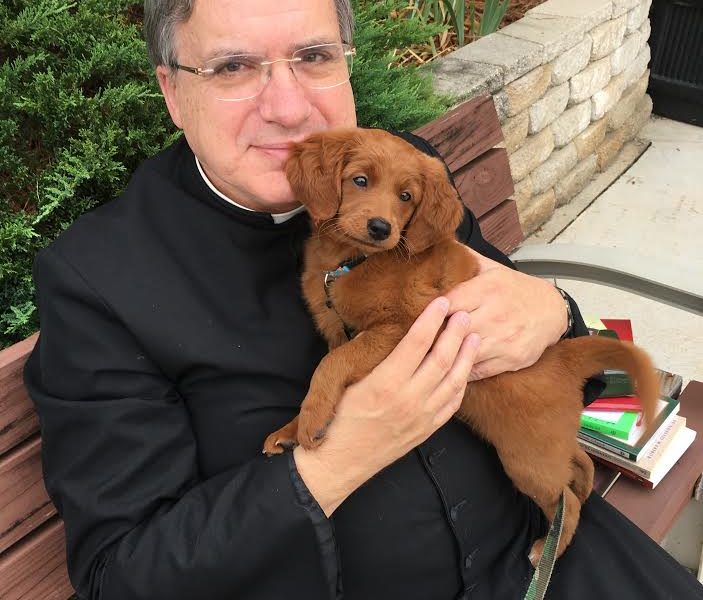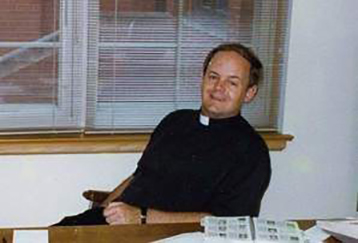Our Lord and Savior, Jesus Christ, uttered these last words from the Cross before He gave up His spirit, to signify that His Self-Sacrifice was now complete; His Redemption was now accomplished; He had paid the price for our sins by the offering of His Body and Blood.
The vocation of every baptized Christian is to conform himself to Christ; as St. Paul tells us, it is to “make up in [our] own sufferings what is lacking in the suffering of Christ for the sake of His Body, the Church” (Col. 1:24).
In other words, the vocation of every Christian, every member of Christ’s Mystical Body, the Church, is to be a co-redeemer with Him; to offer our entire lives, especially our sufferings, in union with Christ’s sufferings in order to build up His Body, to spread the Gospel, to atone for sins through and with Christ, to merit grace for the conversion of sinners.
While this is the vocation, the calling, of every Christian, God, we know, in His All-Good and All-Loving Providence, allots to each person a particular share in Christ’s suffering, in His Cross.
Jesus revealed to us that in God’s plan of redemption and salvation, there is a mysterious link between love, suffering, sin and redemption: “God so loved the world that He sent His only Son” to redeem us from our sins by His suffering and death, “so that we might not perish but have eternal life” (cf. Jn. 3:16). And we, the baptized, are part of His redemptive plan.
My own theory is that God only permits those to suffer more who have the capacity to love more; that those to whom God grants a greater share in Christ’s cross have the capacity to love greatly. His grace is always there to sustain us; and if we accept our crosses with patient resignation to God’s will, out of love for Him and for others, offering them in union with Christ, then our sufferings take on infinite value and we truly redeem the world through, with and in Christ. Seen in this light, through the eyes of faith, suffering is a great gift; nonetheless, it remains a great mystery, not easy to accept and understand.
Last Tuesday, on September 15, the Feast of Our Lady of Sorrows – which was also Fr. Ben’s 57thbirthday – Pope Francis issued his message for the 24th World Day of the Sick, in which he said:
“Illness, above all grave illness, always places human existence in crisis and brings with it questions that dig deep. Our first response may at times be one of rebellion: Why has this happened to me? We can feel desperate, thinking that all is lost, that things no longer have meaning.” The Pope said that in these situations faith in God is tested, but it also reveals positive elements – “not because faith makes illness, pain, or the questions which they raise, disappear, but because it offers a key by which we can discover the deepest meaning of what we are experiencing; a key that helps us to see how illness can be the way to draw nearer to Jesus who walks at our side, weighed down by the cross. And this key is given to us by Mary, our Mother, who has known this way at first hand.”
I remember when Fr. Ben first learned he had ALS. It worried him, but he calmly accepted the news. At that time the disease had not progressed far, and he noticed only a slight slurring of speech.
As the months went by his condition worsened; still, he never complained, never took comfort in self-pity. He met the challenges of each day and tried to carry out his priestly ministry in whatever capacity he was able – in what I would call a heroic fashion: When he could no longer speak clearly, he delivered his homilies through his talking iPad – and some folks commented they liked these homilies better because they were shorter! He continued to visit the sick in the hospital and the homebound, and when he could no longer speak to absolve from sins or administer the Sacrament of Anointing, he would still bring Holy Communion to them. Even when he could walk with only great difficulty, he still made it out into the sanctuary for Mass every day, a real source of inspiration for our parishioners; people would tell me they were moved to tears just watching him up at the altar.
In his weakness and debility he exemplified, most powerfully and beautifully, what it means to be a priest of Jesus Christ and to share in His victimhood.
I saw Bishop Daniel Jenky, the Bishop of Peoria, early last week at the funeral Mass of another priest who was my former pastor (Msgr. Robert O’Connor); the Bishop commented that Ben set an example for all of us in priestly ministry, and that he put the rest of us to shame.
Father Ben and I were ordained together on May 25, 1991. Our friendship began a few years later and he introduced me and other priest friends to Colorado skiing. With Ben I skied down many a mountain slope I should never have been on. Ben would always start down first and when he would hear me express doubt he would just say, “C’mon, you can do it”; and I would follow him down – and became a much better skier as a result.
I’m sure we all have our particular memories of Fr. Ben: his sharp mind (of which, I have to admit, I was envious), his quick wit, and his hearty, infectious laugh which would light up any room he was in.
About 10 years ago Fr. Ben and I, along with another priest, conceived the idea of forming a new priestly society in which we would remain diocesan priests but share a common life. We were both released for studies and began composing a rule of life for the society, The Apostles of Jesus Christ, Priest & Victim. I think the title was Ben’s idea, and we all agreed on the basic concept: to be Christ’s modern-day apostles by imitating Him, the High Priest, who offered Himself as the Supreme Victim, the Sacrificial Lamb, for our sins.
As his condition worsened, Fr. Ben would remark to me, “I never thought being a victim would entail this much suffering.” But he accepted it as part of God’s will, God’s plan for him.
Sr. Cordia Marie, the nurse who cared for Fr. Ben at Mother of Good Counsel Home in St. Louis, got to know him quite well over the months he was there. Ben shared with her his hopes, and his fears. Sister told me that Fr. Ben would often say to her, “I’m not afraid of dying”; but what he did fear most was getting worse physically to the point that his active mind would be locked in a body which was completely unable to move or to communicate.
A line penned by G.K. Chesterton has haunted me ever since I read it almost 40 years ago. Describing Our Lord’s agony in Gethsemane, Chesterton says: “In a garden, Satan tempted man; and in the garden, God tempted God.” Jesus, High Priest and Victim, prayed that night, “Father, if it is possible, remove this cup from me; yet not my will, but yours be done” (Mt. 26:39).
As a priest of Jesus Christ, Fr. Ben offered himself as a living victim: “Whatever God wills, I accept,” he would always say after having contracted ALS. And last Friday, our loving and provident God and Father removed to that cup of suffering which Fr. Ben endured so patiently and nobly.
Sr. Cordia Marie, who was present at the time of Fr. Ben’s death, told me that as his breathing became labored and she knew his end was near, she said to him, “Don’t be afraid.” Ben looked at her, with eyes glowing, and smiled just before he passed; no pain, a beautiful death.
That smile and glowing eyes are a testament to Fr. Ben’s deep faith, and should strengthen our faith and give us comfort at this time of grief and sadness. But there is cause for rejoicing here, for we have no doubt that Ben will rise on the last day with a body glorified – like Christ’s risen body – with no more suffering, no more pain or discomfort; for he daily received the pledge of our future resurrection, the Body and Blood of Jesus in the Eucharist; and Christ assures us: “He who eats my flesh and drinks my blood, I will raise him up on the last day” (Jn. 6:55).
Let us return now to the foot of the Cross, the scene described in our Gospel today, which Fr. Ben chose carefully when I prepared with him his own funeral liturgy. Here we see the Blessed Virgin Mary, the Mother of Our Lord, her Immaculate Heart pierced by that sword of bitter sorrow foretold by Simeon years before. Mary freely offered her Son’s suffering and death to the Father, knowing that it was the price for our salvation.
Jack and Beverly, as Ben’s parents, we know how much you have suffered throughout all of his illness and now at his death; and Beverly, we all see how your motherly heart is pierced with sorrow.
At this time we must remind ourselves that while Ben is no longer here with us bodily, we remain united with him through Christ, in the Holy Spirit. At every funeral Mass I like to remind people of the beautiful doctrine we call the Communion of the Saints; that within Christ’s Mystical Body, the Church, a wonderful exchange of spiritual goods takes place among all the members of His Body: we call upon the saints in Heaven, asking for their intercession; we pray for the souls still atoning for their sins in Purgatory – and our hope is that if Fr. Ben is not yet in heavenly glory, our prayers and Masses offered on his behalf will help him get there soon; and finally, we pray for each other, that God’s grace may strengthen us at this time of loss.
I’ll end here by reciting the Scripture quote on the back of Fr. Ben’s prayer card, which I think sums up his priestly spirit:
“I have fought the good fight,
I have finished the race,
I have kept the faith.
In the future there is laid up for me
the crown of righteousness,
which the Lord, the righteous Judge,
will award to me on that day;
and not only to me, but to all
who have loved His appearing.”
(2 Tim. 4:7)
Amen!







